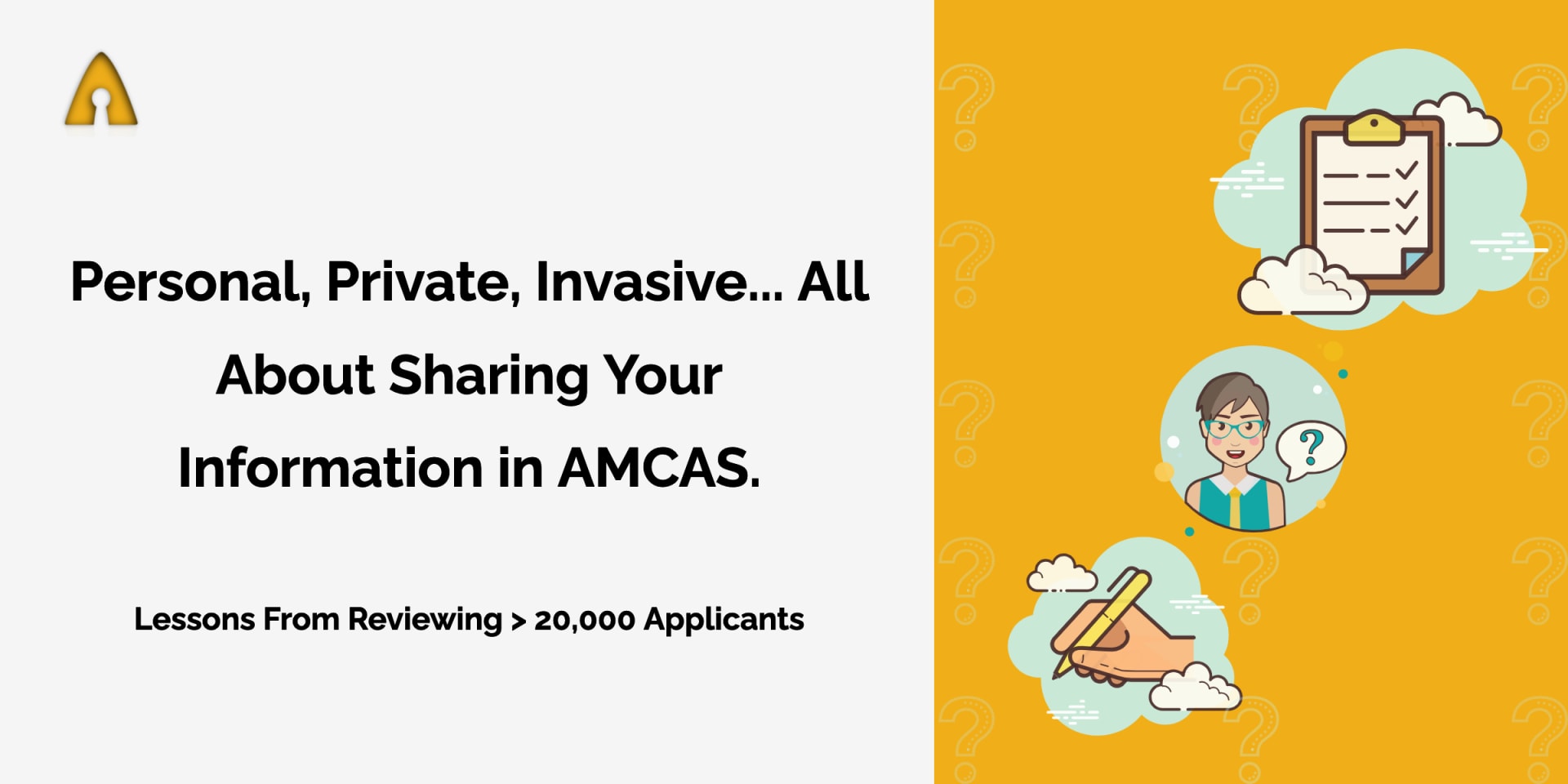Sharing details about yourself with strangers can be scary. Sharing information about yourself with strangers who are deciding whether you will have the opportunity to follow your dream of becoming a physician can be even scarier.
Sharing personal information with strangers is something more than 50,000 applicants to MD-granting medical schools deal with each year when they fill out the American Medical College Application Service (AMCAS) application.
In this article you will learn tips on sharing personal information in AMCAS. We will take a look at some of the difficult questions in the medical school application that many applicants are reluctant to answer.
While many of the questions asked on the AMCAS application are required and/or straight-forward, there are a few that are left to each applicant to decide whether to answer, and if so, how.
From questions of race and ethnicity, to family income, not all applicants are comfortable sharing so much personal information in AMCAS. Applicants question the relevance of certain questions. Applicants also wonder how their responses to some of these more personal or seemingly invasive questions impact their chances of getting into medical school.
As always with the articles/posts here at Apply with Success, I add my own perspective as someone who has reviewed and evaluated many thousands of medical school applications.
Personal Information In AMCAS
Before I go further, I want to make sure you know about the official guide on filling out the AMCAS medical school application, a free resource published by the Association of American Medical Colleges (AAMC). Here is the link to the latest edition. I recommend everyone (students, advisors, parents/guardians) give the guide a read at some point. While the guide does not include tips on how to become a competitive applicant, it does prepare you for what you will be expected to answer when it comes time to apply to medical school.
Certain questions on the medical school application can cause anxiety for applicants. I have divided these difficult questions in the medical school application into several overarching categories.
Many applicants are reluctant to answer questions that fall within the following categories: financial information, demographics, challenges, and blemishes.
For the financial category, we will focus on the family income question. Many applicants do not want to disclose their family’s annual income.
For the demographics category, many applicants would prefer not to disclose their race or ethnicity. This is especially true for applicants who identify with multiple racial and/or ethnic groups.
The optional Disadvantaged Status is the main question that comprises what I have labeled as the challenges category.
The blemishes category comprises questions in AMCAS like Institutional Actions and Misdemeanors/Felonies. While these questions are not optional if applicable, each applicant must decide what details to share.
Financial
“What do medical schools do with family income information?” “How do admissions committees view my family’s income?” “Do admissions committees get to see my financial information?” These questions represent the sentiments of many medical school applicants. Unfortunately, much of the information on the medical school admissions process comes from other applicants. Applicants to medical school must sift through admissions information that is speculative and frequently incorrect.
So what do medical schools do with family income information found in the AMCAS medical school application? It depends, sometimes the answer is, not much. Sometimes financial information is used as one of many factors of holistic review.
What is holistic review? I recently wrote all about holistic review on this blog; however, the quick answer is this: holistic review is a context-driven process of evaluating each medical school applicant.
Admissions officers can use a holistic approach to consider an applicant’s advantages and disadvantages throughout childhood. Family income often factors into those advantages and disadvantages. Family income impacts each applicant’s opportunities to become competitive for medical school. Everything from MCAT preparation to research and medical experiences is (to a varying degree) impacted by financial background.
For readers who are from higher income families, allow me to put you at ease. In all the applications that I have reviewed, I never once thought, “This applicant’s family income is too high, I am going to deny them.” Nor have I seen an applicant’s family income and thought, “this is really low, I should invite them to interview.” It comes down to what applicants have done with the opportunities they have been afforded. What has been achieved despite any challenges or disadvantages?
Demographic
Demographics is the next category of personal information in AMCAS. Many applicants wonder how admissions committees use race and ethnicity in student selection. Race and ethnicity are helpful for holistic review, especially when considered alongside challenges/hardship data (see next category below).
On its own, racial/ethnic data is primarily used for group-level data (what does the incoming class composition look like in terms of diversity?). However, combined with other details found in the AMCAS medical school application, race and ethnicity can be helpful in understanding barriers versus advantages along the path of preparing for medical school.
Challenges/Hardships
This category includes questions in the AMCAS application such as, the Disadvantaged Status, whether an applicant is from an underserved area, and possibly even the personal statement. For this category I will focus on the Disadvantaged Status. The Disadvantaged Status is, perhaps, the most difficult question in the medical school application.
The Disadvantaged Status is a topic deserving of its own article, in fact, I have written several (including my doctoral dissertation).
There is a link to my dissertation on the main page of the Apply with Success blog; here is a direct link in case you ever want to skim through it.
For now, I will discuss the Disadvantaged Status from the perspective of sharing personal information. My dissertation is quite lengthy. I also wrote an article on the Disadvantaged Status for the journal, Academic Medicine. That article is much shorter. You can check it out here.
Without going too far down the rabbit hole that is the Disadvantaged Status, this is an optional question in the AMCAS application that allows applicants the opportunity to share with their chosen medical schools any challenges or hardships that could be considered more severe than what a typical applicant experiences.

There are a variety of reasons why “disadvantaged” applicants may choose not to use the Disadvantaged Status. Many applicants who could make the case that they are or have been “disadvantaged” choose to not use the Disadvantaged Status for fear of being judged negatively by their medical schools.
As one medical student explained to me, a participant in my doctoral research, when she was applying to medical school, because she did not know how the Disadvantaged Status would be used, she thought, “it seemed like the safer option was not to check the box.”
Another participant in my doctoral study thought that medical school applicants may not want to use the Disadvantaged Status, “because then that becomes how they sum you up.”
All of the medical students who participated in my dissertation research believed that there are many applicants who are reluctant to use the Disadvantaged Status due to uncertainty about how their personal information would be used by medical schools.
Blemishes
Lastly, we arrive at blemishes. Blemishes are those moments that are either required to be disclosed (think institutional actions), as well as less-severe circumstances that you may want to address in the personal comments essay.
I wrote about Institutional Actions in a previous article. While the reporting of Institutional Actions is required, what you write in the accompanying essay is up to you. If you find yourself needing to report an institutional action, there are a few steps you will want to take.
I go into step-by-step detail on reporting institutional actions in the article I wrote right here; however, it is worth restating that there are a few key ingredients to writing an institutional action essay. Those ingredients are honesty, completeness, and succinctness.
Honesty
This goes without saying; tell the truth, the whole truth, and nothing but the truth. Applicants who either fail to report an Institutional Action, or leave out key details may end up with what is called an Investigation. According to the 2020 AMCAS Applicant Guide, “Failure to provide an accurate answer to the question about institutional action … will result in an investigation.”
Completeness
When addressing any blemishes, it is important that you provide all the relevant details. Completeness connects both honesty and succinctness. Completeness means providing all of the information that is needed to satisfy an honest response. However, completeness should not come at the expense of being succinct in providing personal information, whether in filling out the Institutional Action section, or elsewhere in the AMCAS medical school application.
Succinctness
We have gone over this together before, both in this article and in others on the Apply with Success website; however, it is worth mentioning at least one more time. Anything applicants can do to make application reviewers’ jobs easier is a good idea.
Be honest, complete, and succinct when providing personal information in AMCAS. This includes the Personal Comments Essay, work/activities descriptions, institutional actions, Disadvantaged Status, and secondary application questions. While this may seem obvious, every year, many applicants decide not to disclose demographic information. Applicants choose not to state clearly the circumstances behind their institutional actions. Many applicants even make it difficult to understand their exact responsibilities in one or more of their reported work/activities experiences.
By now you are hopefully picking up on a theme in this article; applicants should not be reluctant to share personal information with medical schools.
While some of the more personal information in AMCAS may seem prying or invasive, keep in mind that every additional detail shared with admissions committees is one more ingredient to add flavor to your recipe and one more pixel to add clarity to your photograph.
Consider this:
Application readers include any member of the admissions committee or admissions office tasked with deciding who gets rejected and who receives an invitation to interview. Application readers appreciate when applicants are transparent, honest, and detailed (organized detail, not long-winded or rambling). The more an application reader needs to guess while reviewing an application, the more cautious they will likely be when issuing their final judgement.

Do not assume application readers are going to fill in the blanks on why you did not have as much experience or as high of grades as other applicants. If you want your application reviewers to be able to advocate for you, give them the details so they can understand. Every detail you provide in your application adds context. Your details position your accomplishments within the context of any opportunities or hardships.
Conclusion
So here we are at the end of the article. This article has been somewhat different than most of the posts on the Apply with Success blog. While I usually break down a topic into many elements, this time, everything seems to boil down to one major takeaway.
The Major Takeaway and My Number 1 Tip
Be honest, complete, and succinct, even (especially!) when it comes to sharing personal information in AMCAS. It is that simple. This is my number one tip when dealing with those difficult questions in the medical school application. Tell it all, tell it true, and do not add anything extra. The application is already long enough. Don’t ask your medical schools to read more than is necessary.
You never know what will be valuable to a particular reviewer at a particular medical school; this is why it is better to simply provide all of the information you can. Let the application reviewers decide what is helpful and what is not.
Reviewers are not looking to make personal judgments about applicants. Be as honest and open as possible in addressing those seemingly invasive and difficult questions in the medical school application.
Keep this in mind, when your application is reviewed by your medical schools, every response not only provides details that inform that one specific question, but also adds value to all of the other sections.
So what is the best strategy for filling out your AMCAS medical school application?
Be honest. Be complete. Don’t leave out key information, even if you think it will work against you. The truth is likely not as bad as you think…nor is it likely as bad as letting your application readers’ creativity run wild. Finally, be succinct. Just as you do not want to leave out important information in AMCAS, you also do not want to go on and on…and on…and on.
When it comes to those essay questions (personal comments essay, your 15 work/activities narratives, institutional actions, Disadvantaged Status), plan on going through multiple drafts. Work to make each draft a little shorter than the previous one.
I hope this article has been helpful.
If you want more information on sharing personal information in the AMCAS medical school application, or any other topic for that matter, let me know.
I wish you the best in all your aspirations.
Sincerely,
Adam Lowrance, PhD
Let me know in the comment section if you found this article helpful. Where are you in the process? Are you applying to medical schools this cycle, or thinking about doing so in the future?

